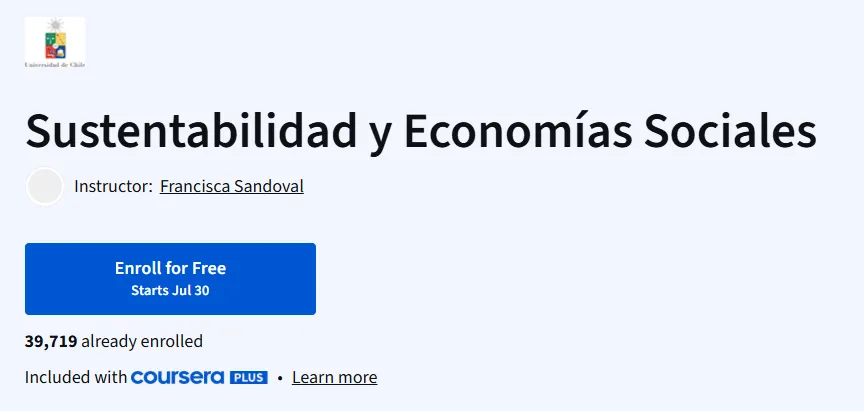What will you learn in Sustentabilidad y Economías Sociales Course
Understand the foundations of sustainability and how they apply to social economies.
Explore key concepts like ecological economics, cooperative models, and ethical finance.
Analyze successful sustainable projects and their economic, social, and environmental impact.
Learn to design and manage community-centered, sustainable economic initiatives.
Program Overview
Module 1: Introducción a la sostenibilidad y a las economías sociales
⏱️ 1 week
Topics: Definitions of sustainability, history of social and solidarity economies, ethical consumption.
Hands-on: Reflective questionnaire and case study analysis.
Module 2: Modelos alternativos de producción y consumo
⏱️ 1 week
Topics: Cooperative enterprises, fair trade, circular economy practices.
Hands-on: Evaluation of production models in your local context.
Module 3: Finanzas éticas y economías transformadoras
⏱️ 1 week
Topics: Solidarity finance, community banks, microcredit systems.
Hands-on: Design of an ethical financial model for a hypothetical community.
Module 4: Ecología y economía
⏱️ 1 week
Topics: Relationship between ecology and economic systems, ecological footprints, and environmental justice.
Hands-on: Ecological impact simulation and carbon budget analysis.
Module 5: Proyectos sostenibles y casos reales
⏱️ 1 week
Topics: Case studies from Latin America and Europe, evaluation frameworks for sustainable practices.
Hands-on: Create a mini-project proposal with sustainability indicators.
Get certificate
Job Outlook
High demand for sustainability experts in public policy, NGOs, education, and community development.
Growing interest in social entrepreneurship and ethical finance worldwide.
Salaries vary by sector but generally range from $30,000–$70,000 annually in sustainability-focused roles.
Opportunities for consultancy, local government positions, and grassroots organization leadership.
Specification: Sustentabilidad y Economías Sociales
|
FAQs
- Provides frameworks for designing community-centered economic initiatives.
- Offers tools to analyze social, economic, and environmental impact.
- Introduces cooperative and fair trade models suitable for local projects.
- Teaches ethical finance and microcredit principles for startup support.
- Encourages creation of mini-projects to test ideas in real contexts.
- Explains sustainability principles that can inform local policy decisions.
- Introduces ecological and social economy frameworks for public programs.
- Analyzes case studies of successful policy-driven sustainable projects.
- Offers insights into designing programs that balance social and environmental goals.
- Supports understanding of community needs for better policy impact.
- Focuses on qualitative and conceptual evaluation methods.
- Introduces ecological footprints and carbon budget analysis.
- Encourages reflective assessment of social and environmental benefits.
- Provides frameworks for project evaluation using sustainability indicators.
- Prepares learners to consider impact beyond purely financial metrics.
- Builds foundational knowledge in sustainability and social economies.
- Equips learners with practical tools for community-focused initiatives.
- Introduces concepts relevant to NGOs, consultancy, and grassroots leadership.
- Offers insights into ethical finance and cooperative models applicable to various sectors.
- Prepares learners to engage in social entrepreneurship with informed strategies.
- Designed for beginners with clear explanations of key concepts.
- Uses real-world case studies to illustrate abstract ideas.
- Focuses on practical applications rather than complex theory.
- Encourages hands-on exercises to reinforce learning.
- Supports gradual understanding of sustainability and social economic systems.





